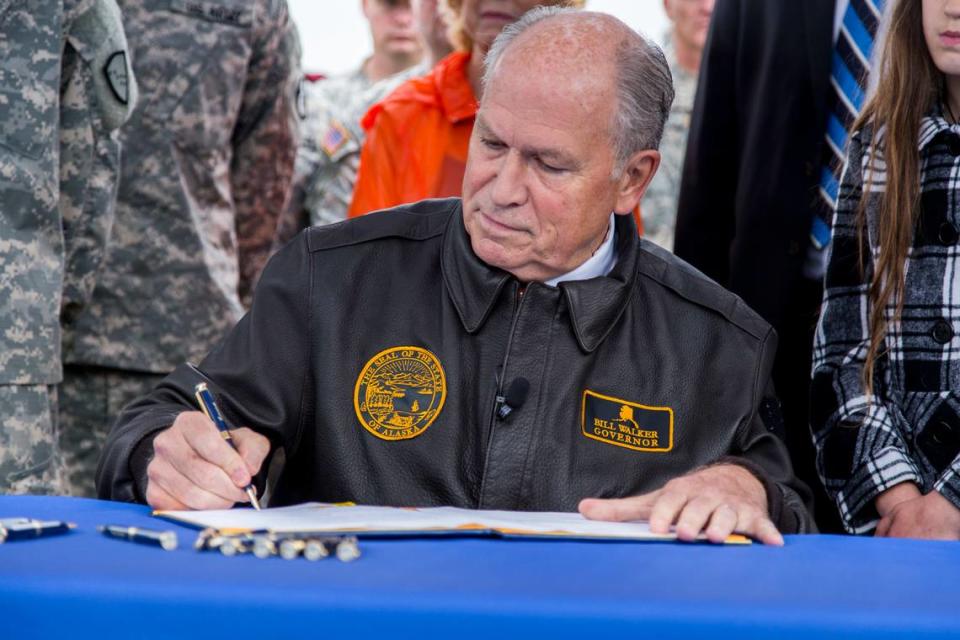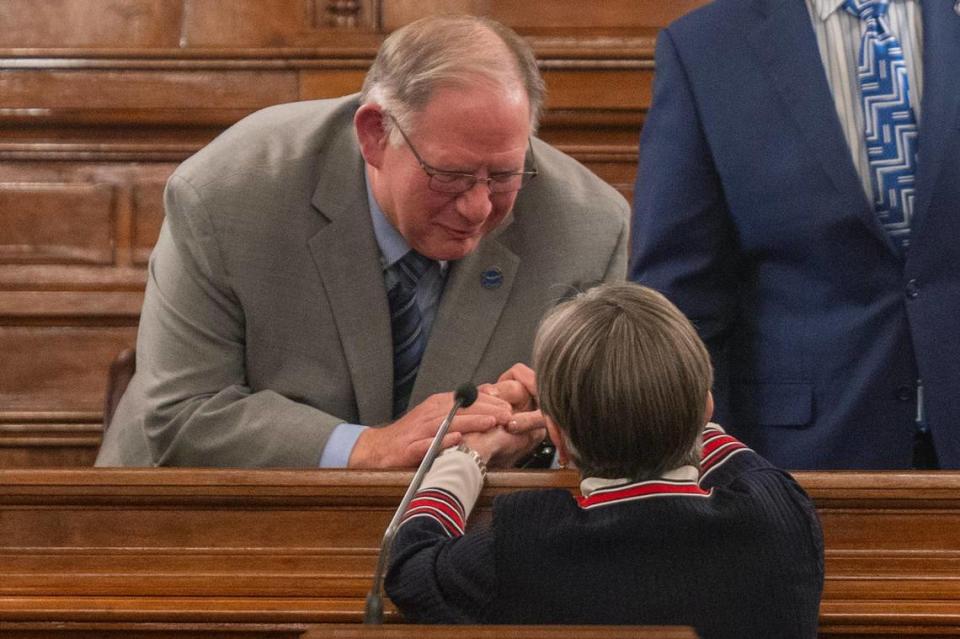It’s time for Kelly to consider the nuclear option to expand Medicaid | Opinion
- Oops!Something went wrong.Please try again later.
There’s a pivotal scene in the movie “Braveheart” where William Wallace (Mel Gibson) explains to one of his lieutenants why he’s riding out to meet with Scottish nobles to try get them to back the revolution, despite warnings that it’s probably a trap.
“You know what happens if we don’t take that chance?”
“What?”
“Nothing.”
Welcome to Kansas Gov. Laura Kelly’s “Braveheart” moment for Medicaid expansion.
After years of legislative refusal to protect the health and well-being of working-poor Kansans, the time has come for Kelly to seriously consider defying the Legislature, inform the federal government she’s accepting expanded Medicaid on behalf of the people of Kansas, and fight it out in court.
For William Wallace, the meeting with the nobles was a indeed a trap, and he was captured and executed. The risk-reward equation isn’t quite as drastic for Kelly.
If she wins, more than 150,000 Kansans — almost 70,000 with no insurance at all — will get access to health care assistance, paid for almost entirely by the federal government.
If she loses, they won’t get health care aid, which they aren’t getting now anyway.
But you know what happens if she doesn’t take that chance?
Nothing.
The Legislature has adjourned for the year — its seventh year in a row — without a straight up or down vote on Medicaid expansion. There is nothing to indicate that this will ever change.
In the waning days of this year’s session, a last-ditch effort to pull Medicaid expansion out of the legislative committee where it’s been languishing was rejected by the state Senate, effectively killing it.
The vote was 18 in favor of debating expansion to 17 against, but due to Senate procedural rules, 24 of the 40 senators would have had to vote yes for it to proceed.
It’s like this every year. Democrats try to bring the issue to the floor. Republican leadership finds a way to block it.
It’s like a bad soap opera that’s been recycling the same plotline for far too long.
Going it alone
The reputable Kansas Speaks survey by Fort Hays State University shows that about seven out of 10 Kansans support Medicaid expansion.
There’s also a significant number of Republican lawmakers who would support it, but fear that if they cross their leaders, House Speaker Dan Hawkins of Wichita and Senate President Ty Masterson of Andover, they’ll be stripped of their assignments to key committees that matter at the Statehouse, to the detriment of their constituents, several have told me off the record.
It didn’t have to be like this. It probably doesn’t have to be like this.
If Kelly were to move forward on her own, she wouldn’t be the first governor to do so.

In gaming out the scenario, I spoke with former Alaska Gov. Bill Walker, an Independent who brought Medicaid expansion to his state via executive order nine years ago.
“It had been before the Legislature a number of times and they wouldn’t put it to a vote,” Walker said. “I thought it was absolutely ridiculous that we as Alaskans were paying taxes for something we were not receiving, No. 1.
“And No. 2, health care should not be a partisan issue, at all. And No. 3, if you don’t have your health, you can’t work, you can’t hunt, you can’t feed yourself on subsistence . . . Your whole world comes to an end if you don’t have your health.”
He said he decided to go it solo after he got fed up with legislative leaders blocking a vote, which should be a familiar tune to anyone who’s been watching Topeka over the years.
“I gave the Legislature the option, as long as you put it to a vote in the House and Senate, I will honor what you do.” Walker said. “They didn’t do that. I called a special session and I put one thing on the special session, which was Medicaid expansion, and they would still not put it to a vote. So I said, ‘Fine, I’ll do it myself,’ knowing full well that I was going to get sued, which I did, and we prevailed, which I knew we would.”
Even though he’s not governor anymore, “No one has made any attempt to undo what I’ve done,” Walker said. “It’s harder to take something away from someone once they have it versus the other way around.”
Also, despite dire warnings of runaway costs for the state, (sound familiar, Kansas?) that never happened either, he said.
“I’m pretty fiscally conservative and we saved hundreds of millions of dollars in our budget by having Medicaid expansion, because we were paying for health care for people who were incarcerated and for other folks who were under our care and obligation, that Medicaid would have covered,” Walker said.
“They’re not the healthiest bunch, so if they needed a heart bypass or some such, we were paying for that — all this medical stuff that we weren’t paying after Medicaid expansion. To this day people will come up to me and say ‘I like what you did, but how much money did Medicaid expansion cost us?’ I say, no, no, it didn’t cost us, we saved money.”
In testimony to the Kansas Legislature, Sedgwick County Sheriff Jeff Easter projected similar substantial savings for the jail he manages and jails across the state.
He cited cases in which only two inmates had required treatment exceeding $1.6 million. Medicaid paid most of that, but the county still was on the hook for more than $270,000.
”If (Medicaid expansion) were to pass, the money spent on these two inmates would have a substantial impact on local taxpayers,” Easter testified. “The entire (county) bill of $271,434.05 would have been paid for by federal dollars . . . These medical costs will ultimately come from local tax dollars. (Medicaid expansion) would allow those tax dollars to come from the much larger national tax pool than from limited county property tax resources.”
In Alaska, Medicaid expansion didn’t just save money, it saved lives.
Walker tells of going out to dinner at a nice restaurant with live music: “As I walked by the guy playing the piano, he said, ‘Governor, I want to play a song for you.’ I said ‘Great, why do you want to do that?’ He said ‘You saved my life.’”
Turned out the musician had had a brain tumor, but no health coverage.
“The doctors timed his surgery almost to the minute of when the Medicaid expansion came into effect,” Walker said. “I had a number of those kinds of experiences. There’s a real side to it as well, not just the economic side of it.”

14 years and counting
It’s now 14 years since Congress passed the Affordable Care Act and 10 years since the act was modified to offer expanded Medicaid, with the federal government picking up at least 90% of the tab.
That’s 14 years of unnecessary human suffering as uninsured Kansans either went without needed medical care or entered into ruinous debt trying to pay for it.
And we can lay that squarely at the feet of legislators who care more about pleasing Koch Industries political front groups than their constituents — that and the sad and ongoing legacy of former Gov. Sam Brownback, who blocked health care for the working poor every chance he got.
Because of Brownback’s cynical shenanigans, Kelly would face a higher degree of difficulty than Walker did in expanding Medicaid by executive order.
Unlike Walker, Kelly would have to overcome a state law that purports to make her or any future governor play “Mother May I?” with the Legislature before accepting expanded Medicaid.
There’s a history here.
When the federal government offered Medicaid expansion to the states, it was given as a governor’s option whether to accept it or not.
Brownback, facing what appeared to be a tough re-election fight, didn’t have the guts to reject it on his own. So he feigned neutrality while his minions in the Legislature did the dirty work for him.
Together, they passed a law stating: “Medicaid, shall not be expanded . . . unless the legislature expressly consents to, and approves of, the expansion of medicaid services by an act of the legislature.”
That allowed Brownback to act like his hands were tied and he won re-election. He didn’t have to show his own cards on expansion until 2017, when both houses of the Legislature did approve Medicaid expansion, and he vetoed it.
So much for letting the Legislature decide.
Former Rep. Jim Ward of Wichita was in the Legislature when it took power over Medicaid expansion and said the manipulation of the process was stunning.
“I thought it was a big mistake to take it away from the governor, because the feds gave it to the governors to make the decision to expand,” he said. “The Legislature passed a law to say, ‘Not in Kansas.’”
The law originally came through the door as a floor amendment to another Medicaid bill. About two years later, when the same statute came back before the Legislature, Ward proposed amending it to restore the governor’s authority.
House leadership ruled Ward’s amendment was “not germane” to the discussion, shutting it down even though it dealt with language that was in the bill that was under consideration.
“I said how can it be that the amendment to take the governor’s power away is germane, but not to put it back?” Ward said. “(Former Republican Rep.) Blaine Finch was the chair and I never saw a more embarrassed or sheepish look. He looked at me like ‘Jim, you know what’s going on here. It’s a political ruling and we are not going to discuss this.’”

Taking it to court
After a Brownback speech at a recent meeting of the Wichita Pachyderm Club, I asked him what he thought would happen if Kelly tried to expand Medicaid on her own. He declined to comment.
I put the same question to House Speaker Hawkins after anti-expansion town hall meeting in Plainville sponsored by the Conservative Alliance of Rooks County, with dinner provided by the Koch front group Americans for Prosperity.
Hawkins said if Kelly tries to expand Medicaid on her own, the Legislature will take her to court.
That wouldn’t be the worst thing.
I spoke to two lawyers with legislative experience, Ward and Rep. John Carmichael, also of Wichita.
Carmichael said the governor could argue that the federal action empowering governors to accept expanded Medicaid supersedes the state law making it the Legislature’s option.
Kelly could also argue that the Legislature overstepped its authority under the separation of powers in the Kansas Constitution, by trying to bar any current and future governors from accepting expansion without legislative approval, he said.
Ward concurred that Kelly would have a better chance of getting Medicaid expansion through the courts than she does getting it through the Legislature. But he said it would be out of character.
“For her to step out and color out of the lines that far?” he said. “You can’t see many times where she’s picked a fight with the Legislature and nowhere near that kind of fight. It’s just not her personality.”
But he noted she’s term-limited out of office next year and would have little to lose by trying, other than stirring up a few Republican leaders and talk-radio talking heads who would accuse her of being the one trying to overstep separation of powers.
“It would be a super great fight to have in your last two years,” Ward said. “I do think it would be a good way to make yourself relevant for your last two years, on a significant issue that affects a lot of Kansans.”
He added that the tension and attention of a high-stakes Supreme Court case would likely turn Medicaid into an issue that would motivate voters, which it really isn’t today, despite its widespread support in polls.
“Even if she loses, it puts it out in the front as one of the big issues in the next governors’ race,” he said. “There’s no downside, other than it would consume the attention of everybody, which isn’t bad.”
There will probably never be a better time to try.
The American Rescue Plan Act offers bonus funding over the next two years for holdout states to adopt expanded Medicaid.
For Kansas, that would be $509 million over two years, equivalent to eight years of state matching funds for the program, according to the Kansas Health Institute.
And Kelly would have until January of 2025 to fight the Legislature in court.

The nuclear option
A major reason the Legislature won’t move is that political groups backed by billionaire business interests are arrayed against Medicaid expansion, including the American Legislative Exchange Council, better known as ALEC, which Masterson serves as national chair.
The Cato Institute, Kansas Policy Institute and Americans for Prosperity have been instrumental in creating and amplifying Medicaid opponents’ chief talking point that would-be recipients are nothing more than “able bodied” slackers unwilling to work.
That is patently untrue.
According to the Kansas Health Institute, 151,898 Kansans, including 106,450 adults and 45,448 children would be newly eligible under expanded Medicaid. About 68,000 of those Kansans have no health coverage at all — others face ruinous rates on the open market.
Of the adults who would benefit, seven out of 10 are working, according to the KHI.
They have jobs that don’t provide health benefits and they can’t qualify for insurance subsidies because of a glitch in a U.S. Supreme Court decision in 2012. The decision upheld most of the Affordable Care Act, but left it to states to decide whether to expand Medicaid.
That created a “donut hole” in health care for people who make too much money to qualify for Medicaid and too little to get subsidized coverage through the insurance exchanges created by the ACA.
In an effort to accommodate Republican concerns, Kelly offered to add a work requirement as part of the expansion.
Of the 30% of potential enrollees who are not working, 38% have a child in the home, 19% have a disability and 16% are students, according to the KHI.
Forty other states have accepted expanded Medicaid to help people in those situations, and it’s well past time for Kansas to do the same.
They’re all people and they’re all worth fighting for.
Fighting for them are dozens of poverty-relief organizations and practically the entire medical community of Kansas — especially rural hospitals that have been dying off one by one because the Legislature stubbornly refuses to accept the additional federal revenue.
We’ve wasted 10 years on hearings, testimonials, round tables and town halls involving thousands of Kansas citizens. Persuasion hasn’t worked. If anything, the people at the top in the Legislature are more entrenched now than ever.
Make no mistake about it — Kelly going it alone on Medicaid expansion would be a nuclear option.
Like most nuclear options, it’s messy, divisive and carries the potential for collateral damage and unforeseen consequences, so I don’t suggest it lightly.
But we’re dealing with people’s lives here, and sometimes, pushing the red button is the only way to remove an immovable obstacle.
And these days, obstacles don’t come any more immovable than the Kansas Legislature on Medicaid expansion.

